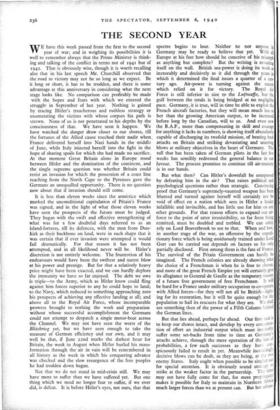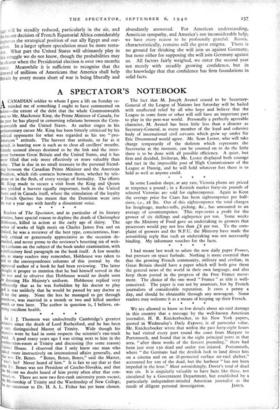THE SECOND YEAR
WE have this week passed from the first to the second year of war; and in weighing its possibilities it is well to remember always that the Prime Minister is think- ing and talking of the conflict in terms not of 1941 but of 1942. That is obviously wise, though it is worth recalling also that in his last speech Mr. Churchill observed that the road to victory may not be so long as we expect. Be it long or short, it has to be trodden, and there is some advantage at this anniversary in considering what the next stage looks like. No comparison can profitably be made with the hopes and fears with which we entered the struggle in September of last year. Nothing is gained by tracing Hitler's treacherous and ruthless strategy or enumerating the victims with whose corpses his path is strewn. None of us is not penetrated to his depths by the consciousness of that. We have seen it happen. We have watched the danger draw closer to our shores, till the fortunes of the Allied cause touched their nadir when France delivered herself into Nazi hands in the middle of June, while Italy injected herself into the fight in the hope of sharing spoils for which she had made no sacrifice. At that moment Great Britain alone in Europe stood between Hitler and the domination of the continent, and the single supreme question was whether Britain could resist an invasion for which the possession of a coast line reaching from the North Cape to the Pyrenees gave the Germans an unequalled opportunity. There is no question now about that if invasion should still come.
It is less than eleven weeks since the armistice which marked the unconditional capitulation of Petain's France was signed, and in the light of what those eleven weeks have seen the prospects of the future must be judged. They began with the swift and effective strengthening of what was for a few doubtful days referred to as an island-fortress, till its defences, with the men from Dun- kirk as their backbone on land, were in such shape that it was certain that if ever invasion were attempted it would fail dramatically. For that reason it has not been attempted, and in all likelihood never will be. Hitler's discretion is not entirely welcome. The frustration of his endeavours would have been the swiftest and surest blow at his power and prestige. But for that a relatively heavy price might have been exacted, and we can hardly deplore the immunity we have so far enjoyed. The debt we owe is triple—to the Army, which as Hitler knew could fling against him forces superior to any he could hope to land; to the Navy, which reduced to something approaching zero his prospects of achieving any effective landing at all; and above all to the Royal Air Force, whose incomparable prowess brought to nothing the work and preparation without whose successful accomplishment the Germans could not attempt to despatch a single motor-boat across the Channel. We may not have seen the worst of the Blitzkrieg yet, but we have seen enough to take the measure of German efficiency and our own, and it may well be that, if June 22nd marks the darkest hour for Britain, the week in August when Hitler hurled his mass- formation through the air in vain will be remembered in all history as the week in which his conquering advance was checked and the slow resurgence of the free peoples he had trodden down began.
Not that we do not stand in mid-crisis still. We may have more to suffer than we have suffered yet. But one thing which we need no longer fear to suffer, if we ever did, is defeat. It is before Hitler's eyes, not ours, that that spectre begins to lour. Neither he nor anyone Germany may be ready to believe that yet. With all Europe at his feet how should he conceive of his triumph as anything but complete? But the writing is revealing itself on the wall. British sea-power is doing its work as inexorably and decisively as it did through the years in which it determined the final issues a quarter of a cen- tury ago. Air-power is turning against the nation which relied on it for victory. The Royal Air Force is still inferior in size to the Luftwaffe, but the gulf between the totals is being bridged at no negligible pace. Germany, it is true, will in time be able to exploit the French aircraft factories, but they will mean much less to her than the growing American output, to be increased before long by the Canadian, will to us. And even now the R.A.F., more than compensating in skill and courage for anything it lacks in numbers, is showing itself abundantly capable of discharging its twofold mission, of beating back attacks on Britain and striking devastating and unerring blows at military objectives in the heart of Germany. The toll that has been taken of German pilots in the last five weeks has sensibly redressed the general balance in our favour. The process promises to continue till air-mastery is in our hands.
But what then? Can Hitler's downfall be compassed by defeating him in the air? That raises political and psychological questions rather than strategic. Convincing proof that Germany's supremely-vaunted weapon has been blunted and turned against herself will certainly not be void of effect on a nation which sees in Hitler a leader infallible and invincible, and has little use for him on any other grounds. For that reason efforts to expand our air- force to the point of utter irresistibility, so far from being remitted, must be doubled and trebled. We can safely rely on Lord Beaverbrook to see to that. When and how, in another stage of the war, an offensive by the expedi- tionary force which is being assiduously trained under Lord Gort can be carried out depends on factors so far only partially disclosed. First among them is the fate of France. The survival of the Petain Government can hardly be imagined. The French colonies are already showing what the choice of a Frenchman is when he is free to choose, and more of the great French Empire yet will certainly give its allegiance to General de Gaulle as the temporary trustee of a future free government of free Frenchmen. It will be hard for a France under military occupation to co-operate with Allied forces—for they will not all be British---fight- ing for its restoration, but it will be quite enough for the population to hail its rescuers for what they are. We shall see something then of the power of a Fifth Column behind the German lines.
But that lies ahead, perhaps far ahead. Our first task is to keep our shores intact, and develop by every commtra- tion of effort an industrial output which must inevitably suffer some set-backs from time to time as GermanY; attacks achieve, through the mere operation of the law o' probabilities, a few such successes as they have con- spicuously failed to result in yet. Meanwhile incr casingIF decisive blows can be dealt, as they are being, at the two enemy States. Italy ought when possible to be singled °.`1' for special attention. It is obviously sound strategy strike at the weaker factor in the partnership. The time may not have fully come for that, for mere prop:nquit`. makes it possible for Italy to maintain in Northern Africa much larger forces than we at present can. But her adv.'''. e will be steadily reduced, particularly in the air, and e recent decision of French Equatorial Africa-considerably proves the strategical position of our ally Egypt and our- Ives. In a larger sphere speculation must be more tenta- ive. What part the United States will ultimately play in s struggle we do not know, though the probabilities may clearer when the Presidential election is over two months pence. Meanwhile it is sufficient to recognise that the demand of millions of Americans that America shall help Britain by every means short of war is being liberally and abundantly answered. For American understanding, American sympathy, and America's not inconsiderable help, we have every reason to be profoundly grateful. Russia, characteristically, remains still the great enigma. There is no ground for thinking she will join us against Germany, but none either for supposing she will join Germany against us. All factors fairly weighed, we enter the second year not merely with steadily growing confidence, but in the knowledge that that confidence has firm foundations in solid facts.



























 Previous page
Previous page